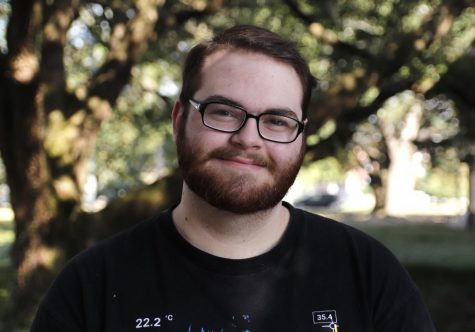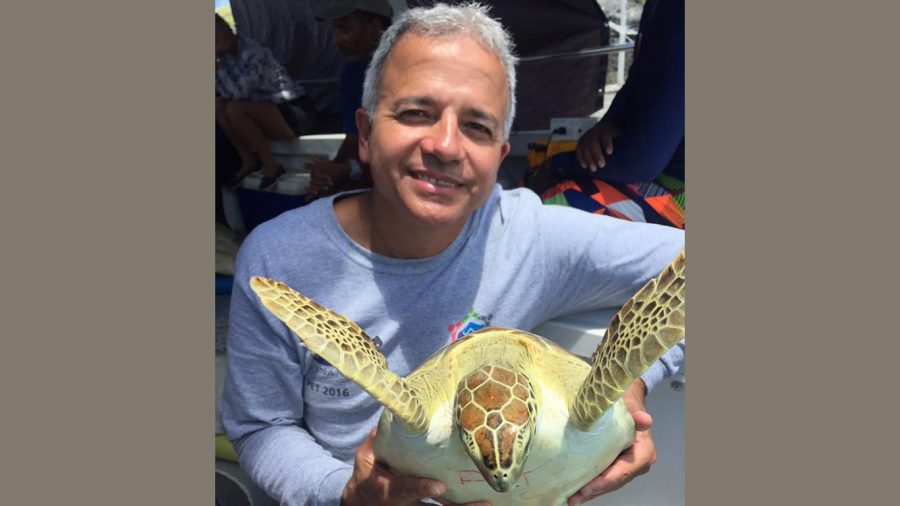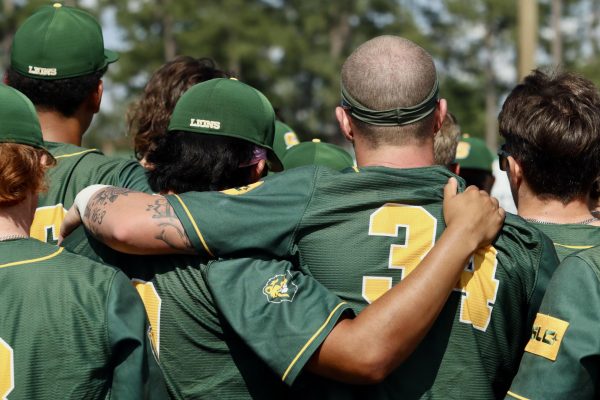University biologist contributes to sea turtle research
Courtesy of Valverde
Dr. Roldan A. Valverde, a professor of biology, poses for a picture with a sea turtle. Valverde researches sea turtles and also works as the scientific director of the Sea Turtle Conservancy operating in Gainesville, Florida.
A university professor has contributed to research on sea turtles published by other zoologists from around the nation.
The New York Times recently published an article named “Mother Sea Turtles Might Be Sneakier Than They Look” that explained a study done by two zoologists who said that sea turtles disguise their nests as decoy against predators. Another zoologist featured in the article was a university professor who is skeptical of the study.
That zoologist is Dr. Roldan A. Valverde, a professor in the Department of Biological Sciences and the scientific director of the Sea Turtle Conservancy operating in Gainesville, Florida.
“First of all, the word decoy assumes that, whatever they do after they lay their eggs in one nest, is going to look like another nest so that the predators will be confused, but that doesn’t happen.” said Valverde in response to the study.
Valverde explained that sea turtles leave a crater where they lay their eggs. Then, they start covering their nest with the front and back flippers.
“In doing so, they move forward a tad, but what they do there looks nothing like their real nest,” said Valverde. “So it’s hard to call that a decoy, but if you look at what they do before they lay eggs, they do attempt to dig other nest chambers, and I will call those decoys but not what they do after they actually lay eggs.”
Valverde was born and raised in Puntarenas, Costa Rica, the main fishing port of the Pacific Costa Rica region, and majored in marine biology at the Universidad Nacional de Costa Rica.
After graduating, Valverde drifted from project to project until he came across an ad to work with the Olive Ridley sea turtle population of the Playa Nancite beach in Costa Rica.
“Working with those animals day and night for so long for a couple of years really awakened that interest in me, and I continued to study these animals and wanted to do more than the levels I was currently doing because I was only an undergrad, so I decided to go to grad school,” shared Valverde. “That is when I specialized in something else, and that was the endocrinology of sea turtles, and that is what I have been doing since then.”
In 2016, after his work for the Caribbean Conservation Corporation, now called the Sea Turtle Conservancy, he became the scientific director of the nonprofit organization.
For students at the university who want to do research in the field of biology, Valverde shared tips on becoming successful in this field.
“The main thing that they need to understand is that they do not need to specialize at this level [undergraduate], ” said Valverde. “You can get your degree in biology here and then go into a graduate program somewhere else to get the specialization you need.”
Your donation will support The Lion's Roar student journalists at Southeastern Louisiana University.
In addition, your contribution will allow us to cover our annual website hosting costs.
No gift is too small.

Austin Dewease is a communication major from Slidell. He has been a staff reporter with The Lion’s Roar since March 2020. Austin has a passion for filmmaking,...







